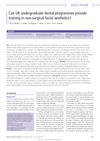 December 2015 in “Kosin Medical Journal”
December 2015 in “Kosin Medical Journal” PCOS treatment should address both symptoms and metabolic risks, starting with lifestyle changes and possibly including medication.
 October 2010 in “Cambridge University Press eBooks”
October 2010 in “Cambridge University Press eBooks” Lifestyle changes like diet and exercise are key for treating overweight women with polycystic ovary syndrome.
 April 2008 in “Obstetrics, gynaecology and reproductive medicine”
April 2008 in “Obstetrics, gynaecology and reproductive medicine” Hirsutism is often caused by high male hormone levels and can be treated with lifestyle changes and medications.
466 citations,
June 2009 in “Experimental dermatology” We now understand more about what causes acne and this could lead to better, more personalized treatments.
 6 citations,
August 2023 in “Fertility and Sterility”
6 citations,
August 2023 in “Fertility and Sterility” The 2023 guideline for PCOS suggests using updated diagnostic criteria, assessing related health risks, and recommends lifestyle changes and specific treatments for symptoms and fertility issues.
 12 citations,
May 2017 in “Pharmacology & therapeutics”
12 citations,
May 2017 in “Pharmacology & therapeutics” Targeting immune tolerance issues in Alopecia Areata could restore hair growth and maintain remission.
 23 citations,
September 2015 in “International Journal of Molecular Medicine”
23 citations,
September 2015 in “International Journal of Molecular Medicine” Activating ER-β, not ER-α, improves skin cell growth and wound healing.
 September 2023 in “Physiology and Pharmacology”
September 2023 in “Physiology and Pharmacology” Glucocorticoids can cause various health issues, but some treatments may help reduce these effects.
 August 2015 in “Free Radical Biology and Medicine”
August 2015 in “Free Radical Biology and Medicine” Some treatments can improve skin's defense against damage, but overuse may cause other skin problems.
 35 citations,
May 2012 in “Cochrane Database of Systematic Reviews”
35 citations,
May 2012 in “Cochrane Database of Systematic Reviews” Minoxidil effectively treats female pattern hair loss.
 30 citations,
February 2018 in “Journal of Pharmacy and Pharmacology”
30 citations,
February 2018 in “Journal of Pharmacy and Pharmacology” Hedychium spicatum has medicinal properties but needs more research for scientific validation and use.
 22 citations,
August 2015 in “Cochrane Database of Systematic Reviews”
22 citations,
August 2015 in “Cochrane Database of Systematic Reviews” The study aims to find the best treatment for central serous chorioretinopathy by comparing various options.
 21 citations,
April 2015 in “Psychology Research and Behavior Management”
21 citations,
April 2015 in “Psychology Research and Behavior Management” Cognitive-behavioral therapy is the best treatment for hair-pulling disorder, and combining it with other therapies could improve results.
 June 2023 in “Journal of Ayurvedic and herbal medicine”
June 2023 in “Journal of Ayurvedic and herbal medicine” Pumpkin seeds may improve health due to their rich nutrients and potential to treat various conditions.
 April 2024 in “Frontiers in pharmacology”
April 2024 in “Frontiers in pharmacology” Cynoglossum amabile has medicinal potential but poses safety concerns due to liver toxicity.
 March 2024 in “International Research Journal Of Modernization In Engineering Technology And Science”
March 2024 in “International Research Journal Of Modernization In Engineering Technology And Science” Certain plants like Aloe vera and Neem are effective and safe for treating various skin conditions.
 January 2024 in “GeroScience”
January 2024 in “GeroScience” Using radiation to make mice's hair turn gray helps study and find ways to prevent or reverse hair graying.
January 2020 in “Indian Journal of Pharmaceutical Sciences” Natural products show promise for new hair loss treatments.
 January 2022 in “International review of movement disorders”
January 2022 in “International review of movement disorders” Cannabinoid and steroid-based drugs could be new treatments for Tourette syndrome, but more research is needed to confirm their effectiveness and safety.
 1 citations,
September 2022 in “Molecules”
1 citations,
September 2022 in “Molecules” Fructus Malvae may help with diabetes, tumors, and hair loss due to its various active compounds.
3 citations,
November 2011 in “Small GTPases” Researchers found that hair follicle stem cells can become squamous cell carcinoma due to Ras activation, which could lead to new treatments.
 7 citations,
August 2022 in “Experimental dermatology”
7 citations,
August 2022 in “Experimental dermatology” Blocking YAP/TAZ could be a new way to treat skin cancer.
 October 2023 in “Clinical, Cosmetic and Investigational Dermatology”
October 2023 in “Clinical, Cosmetic and Investigational Dermatology” Supplemented Erzhi Wan may help regrow hair in male pattern baldness by affecting certain cell signaling pathways.
 11 citations,
June 2017 in “British Dental Journal”
11 citations,
June 2017 in “British Dental Journal” Most UK dental schools don't teach non-surgical facial aesthetics, but dentists have a good knowledge base to provide these services.
 3 citations,
May 2014 in “InTech eBooks”
3 citations,
May 2014 in “InTech eBooks” Copper deficiency may cause hair loss, and treating it could involve nutrition and hormones.
 4025 citations,
December 2003 in “Human Reproduction”
4025 citations,
December 2003 in “Human Reproduction” The 2003 consensus updated PCOS diagnosis criteria and linked PCOS to higher risks of diabetes and heart problems, recommending lifestyle changes to lower these risks.
 1265 citations,
October 2013 in “The Journal of Clinical Endocrinology and Metabolism”
1265 citations,
October 2013 in “The Journal of Clinical Endocrinology and Metabolism” The guideline suggests using specific criteria to diagnose PCOS, recommends various treatments for its symptoms, and advises screening for related health issues.
 198 citations,
July 2011 in “Cochrane library”
198 citations,
July 2011 in “Cochrane library” Lifestyle changes can improve body composition, excess male hormone levels, and insulin resistance in women with PCOS.
 105 citations,
January 2010 in “Mediators of Inflammation”
105 citations,
January 2010 in “Mediators of Inflammation” Skin surface lipids are important for skin health and altering them could help prevent aging and treat skin conditions.
 37 citations,
May 1999 in “Australasian Journal of Dermatology”
37 citations,
May 1999 in “Australasian Journal of Dermatology” Early diagnosis and treatment are crucial for preventing permanent hair loss in various scalp conditions, and while new treatments are promising, more research is needed to evaluate their effectiveness.



























